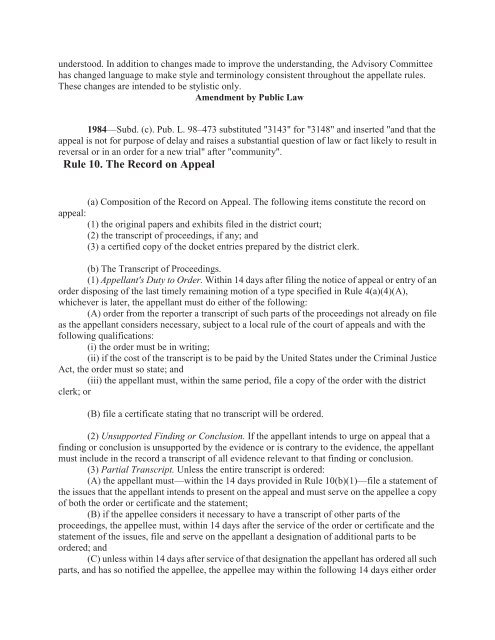Federal Rules of Appellate Procedure 2014-2015, 2014a
Federal Rules of Appellate Procedure 2014-2015, 2014a
Federal Rules of Appellate Procedure 2014-2015, 2014a
You also want an ePaper? Increase the reach of your titles
YUMPU automatically turns print PDFs into web optimized ePapers that Google loves.
understood. In addition to changes made to improve the understanding, the Advisory Committee<br />
has changed language to make style and terminology consistent throughout the appellate rules.<br />
These changes are intended to be stylistic only.<br />
Amendment by Public Law<br />
1984—Subd. (c). Pub. L. 98–473 substituted "3143" for "3148" and inserted "and that the<br />
appeal is not for purpose <strong>of</strong> delay and raises a substantial question <strong>of</strong> law or fact likely to result in<br />
reversal or in an order for a new trial" after "community".<br />
Rule 10. The Record on Appeal<br />
(a) Composition <strong>of</strong> the Record on Appeal. The following items constitute the record on<br />
appeal:<br />
(1) the original papers and exhibits filed in the district court;<br />
(2) the transcript <strong>of</strong> proceedings, if any; and<br />
(3) a certified copy <strong>of</strong> the docket entries prepared by the district clerk.<br />
(b) The Transcript <strong>of</strong> Proceedings.<br />
(1) Appellant's Duty to Order. Within 14 days after filing the notice <strong>of</strong> appeal or entry <strong>of</strong> an<br />
order disposing <strong>of</strong> the last timely remaining motion <strong>of</strong> a type specified in Rule 4(a)(4)(A),<br />
whichever is later, the appellant must do either <strong>of</strong> the following:<br />
(A) order from the reporter a transcript <strong>of</strong> such parts <strong>of</strong> the proceedings not already on file<br />
as the appellant considers necessary, subject to a local rule <strong>of</strong> the court <strong>of</strong> appeals and with the<br />
following qualifications:<br />
(i) the order must be in writing;<br />
(ii) if the cost <strong>of</strong> the transcript is to be paid by the United States under the Criminal Justice<br />
Act, the order must so state; and<br />
(iii) the appellant must, within the same period, file a copy <strong>of</strong> the order with the district<br />
clerk; or<br />
(B) file a certificate stating that no transcript will be ordered.<br />
(2) Unsupported Finding or Conclusion. If the appellant intends to urge on appeal that a<br />
finding or conclusion is unsupported by the evidence or is contrary to the evidence, the appellant<br />
must include in the record a transcript <strong>of</strong> all evidence relevant to that finding or conclusion.<br />
(3) Partial Transcript. Unless the entire transcript is ordered:<br />
(A) the appellant must—within the 14 days provided in Rule 10(b)(1)—file a statement <strong>of</strong><br />
the issues that the appellant intends to present on the appeal and must serve on the appellee a copy<br />
<strong>of</strong> both the order or certificate and the statement;<br />
(B) if the appellee considers it necessary to have a transcript <strong>of</strong> other parts <strong>of</strong> the<br />
proceedings, the appellee must, within 14 days after the service <strong>of</strong> the order or certificate and the<br />
statement <strong>of</strong> the issues, file and serve on the appellant a designation <strong>of</strong> additional parts to be<br />
ordered; and<br />
(C) unless within 14 days after service <strong>of</strong> that designation the appellant has ordered all such<br />
parts, and has so notified the appellee, the appellee may within the following 14 days either order


















